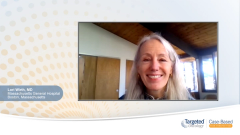
Current Treatment Landscape for Patients With Advanced RAI-Refractory DTC
A medical oncologist provides a comprehensive overview of the current treatment options for patients with advanced RAI-refractory DTC and reviews clinical trial data on sorafenib and lenvatinib.
Episodes in this series

Case: A 64-Year-Old Woman with DTC
Initial presentation
- A 64-year-old woman presents with a painless “lump on her neck” with occasional swelling. She states she noticed this just a few days after returning from vacation.
- PMH: Hyperlipidemia managed with medication; COPD
- PE: palpable, non-tender solitary right-of-the midline neck mass; mobile supraclavicular mass on the same side; otherwise unremarkable
Clinical workup and initial treatment
- Labs: TSH WNL
- Ultrasound of the neck revealed a 3.3-cm suspicious right mass in the lobe of the thyroid; 2 suspicious supraclavicular lymph nodes (LNs), largest 2.0 cm in size.
- Ultrasound-guided FNAB of the thyroid mass and the largest LN confirmed papillary thyroid carcinoma.
- Patient underwent total thyroidectomy with central compartment node dissection and right selective neck dissection.
- Pathology: 3.0-cm papillary thyroid cancer, columnar cell variant; 4/14 lateral positive LN, 3/3 central positive LN
- Largest lateral node was 2.2 cm with no extra-nodal extension
- Margins were negative
- Microscopic extrathyroidal extension present
- Probable stage II; T2N1bM0 papillary thyroid cancer
Subsequent treatment and follow-up
- She was treated with radioactive iodine 150 millicuries
- Whole body scan showed uptake in the neck, consistent with remnant thyroid tissue
- She was started on levothyroxine suppression therapy
- Follow-up at 6 months
- TSH 0.1 µU/mL, thyroglobulin 24 ng/mL (negative anti-thyroglobulin antibodies)
- Chest CT scan showed 8 small bilateral lung nodules only several mm in size
- Next-generation sequencing was negative for mutations, rearrangements
- Follow-up CT chest scan and blood tests 3 months later
- Thyroglobulin increased
- Lung nodules had increased by up to 1 cm in size
- Lenvatinib 24mg po qd was initiated
This is a video synopsis/summary of a Case-Based Peer Perspective featuring Lori Wirth, MD.
Wirth discusses the current treatment landscape for patients with advanced radioactive iodine (RAI)–refractory differentiated thyroid cancer (DTC). She emphasizes the importance of next-generation sequencing testing to identify actionable alterations, such as NTRK fusions, RET fusions, and other oncogenic fusions, which have gene-specific therapies available. For patients without these alterations and progressive disease, non–gene-specific therapies like sorafenib and lenvatinib are FDA approved for first-line treatment.
The DECISION trial, a randomized phase 3 study, compared sorafenib with placebo in patients with progressive RAI-refractory DTC. Sorafenib demonstrated a 12% objective response rate (ORR) and improved progression-free survival (PFS) from 5.8 months with placebo to 10.8 months. The SELECT trial investigated lenvatinib vs placebo, showing a 65% ORR and a significant improvement in median PFS from 3.6 months with placebo to 19 months with lenvatinib. Despite crossover designs, subgroups of patients aged 65 years and older and those with lung metastases experienced significant overall survival benefits with lenvatinib.
Wirth agrees with the decision to start the patient on lenvatinib at 24 mg, the FDA-approved starting dose, based on the patient’s rapidly progressive disease, lung metastases, and slightly more aggressive papillary thyroid cancer variant.
Video synopsis is AI-generated and reviewed by Targeted Oncology® editorial staff.




















